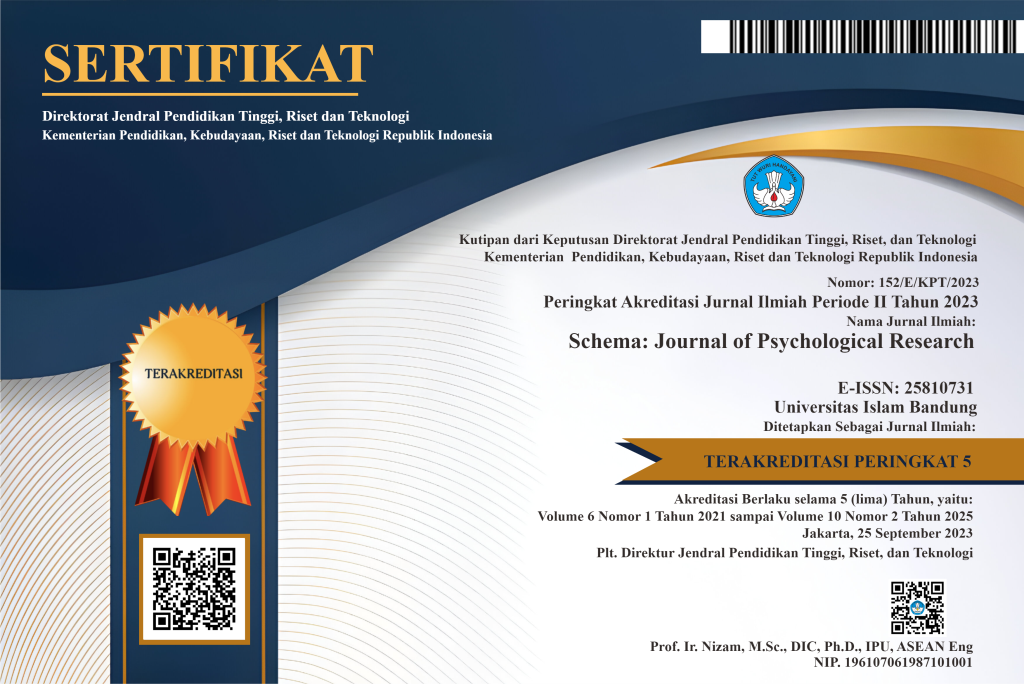Apakah Penjara Menjadikan Narapidana Remaja Berperilaku Agresif
Abstract
The presence of convicts (prisoners) in prisons tend to be associated with the growing likelihood of aggressive behavior of prisoners who have been previously owned. According Kornadt (1981), aggressive behavior occurs because the interaction of individual external factors, namely unpleasant condition with internal factors, namely the motive for aggression. The purpose of this study to describe the behavior of aggression and dynamics based on the concept of aggression proposed by Kornadt (1981). The subjects of this study was 30 teenagers who are prison inmates Rutan Kebon Waru, Bandung. Data obtained using measuring devices, such as: Behavior Aggression Questionnaire which is based on behavioral theory of aggression from Kornadt (1981), Aggression Questionnaire Motive System or SAS from Kornadt, and the results of semi-structure interviews to find out how the inmates live up to the negative affect felt. The results revealed that aggressiveness occurs in adolescent inmates Rutan Kebon Waru residents, Bandung. Aggressive behavior is triggered by negative affective appreciation, a sense of angry, disappointed, annoyed, sourced from a physical condition such as prisons: prisoners are cramped space, lack of ventilation, poor sanitation, to food menus that do not meet nutritional standards. Another source of negative affect comes from a fellow prisoner of mockery, extortion and subsequent negative penggencetan. Afek enable prisoners and the motive of aggression on aggressive behavior occurs, with the goal of a fellow prisoner. Form of aggressive behavior that most often arise and are mostly done is verbal aggression., physical aggression, while a smaller percentage of its appearance. This is presumably related to finding that the combination of motive system aggression in inmates of Rutan Kebon Waru Bandung, is specific, ie, although the motives of high aggression, but aggression is also high barriers. Cultural factors are suspected as a factor influencing the low behavioral aggression in adolescent inmates need to be further investigated.
Keywords
Full Text:
PDF (Bahasa Indonesia)References
Ancok, D. 1989. Teknik Penyusunan Skala Pengukuran. Yogyakarta : Pusat Penelitian Kependudukan UGM
Arikunto, S. 2007. Manajemen Penelitian. Jakarta : Rineka Cipta
Atkinson, R. L., Atkinson R.C., Hilgard, E. R. 2003. Pengantar Psikologi. Jilid 1. Jakarta : Erlangga
Baron, R. A. 1997. Human Aggression. New York and London : Plenum Press
Berkowitz, L. 1995. Agresi 1, sebab dan akibatnya. Jakarta : Pustaka Binaman Pressindo
Brehm, S.S. and Kassin, S.M. 1996. Social Psychology. Boston : Houghton Mifflin Company
Hall, C. S. & Lindzey, G. 1993. Teori-Teori Psikodinamik (Klinis). Yogyakarta : Kanisius
Harahap, P. (1987). Sistem Motif Agresi : Studi Mengenai Pembentukan Sistem Motif Agresi Pada Remaja Batak Toba DI Tempat Asal Dan Di Jakarta Sebagai Implikasi Pengaruh Adat Dalam Praktik Pengasuhan Anak. Disertasi. Bandung : Universitas Padjajaran
Hurlock, E. B. 1980. Psikologi Perkembangan. Jakarta : Erlangga
Kerlinger, F.N. (terjemahan). 1993. Asas-Asas Penelitian Behavioral, Edisi ketiga. Yogyakarta : Gajah Mada University Press.
Kornadt, H. J. (1981b). Outline of Motivation Theory of Aggression. Saarbucken : Fachbereich Sozialund Ummeltwissenschaften
Krahe, B. 2005. Perilaku Agresif. Yogyakarta : Pustaka Pelajar
Laurens, J. M. 2005. Arsitektur dan Perilaku Manusia. Jakarta : PT Grasindo
Monk, F. J., Knoers & Haditono, S.R. 1989. Psikologi perkembangan : Pengantar dalam berbagai bagiannya. Yogyakarta : Gajah Mada University Press.
Morgan, C.T. 1984. Introduction To Psychology, seventh edition. McGraw-Hill Book Company
Santrock, J. W. 2006. Life-Span Development 10th Edition. Mc. Graw-Hill. New York.
Sarwono, S. W. 1992. Psikologi Lingkungan. Jakarta : PT Gramedia Widiasarana Indonesia
Subino. 1997. Konstruksi Tes dan Analisis. Jakarta : Departemen P dan K.
Sudjana, 2002. Metoda Statistika. Bandung : Tarsito
Suryabrata, S. 2003. Metodologi Penelitian. Jakarta : PT Raja Grafindo Persada
DOI: https://doi.org/10.29313/schema.v0i0.2480
Refbacks
- There are currently no refbacks.
Indexed by:
This work is licensed under a Creative Commons Attribution-NonCommercial-ShareAlike 4.0 International License.












